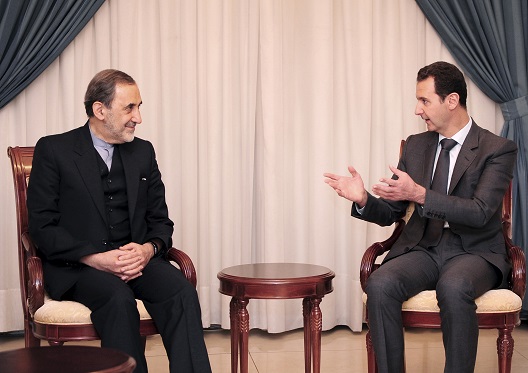 The short answer is “No.” A family and an entourage that placed itself at the disposal of Iran while burning much of Syria to the ground will not prevail, provided the United States and its partners begin to push back. Yet termites are at work, and the fulfillment of this proviso is far from certain.
The short answer is “No.” A family and an entourage that placed itself at the disposal of Iran while burning much of Syria to the ground will not prevail, provided the United States and its partners begin to push back. Yet termites are at work, and the fulfillment of this proviso is far from certain.
The Trump administration, unlike its predecessor, claims to oppose Iran’s domination of what is left of the Syrian state. Unlike his predecessor, US President Donald Trump did not hesitate to strike militarily when Bashar al-Assad, supported by Iran and Russia, twice assaulted defenseless civilians with sarin nerve agent. When Russian “military contractors” sought, in February of this year, to cross the Euphrates River to attack American-held positions, there was no ignominious retreat. On the contrary, the Kremlin learned a hard lesson about testing American resolve east of the Euphrates de-confliction line. Iranian-led Shia militias and regime military units have been similarly educated.
President Trump has verbalized his contempt for Syrian President Bashar al-Assad, a person whose criminal portfolio alone should give pause to those in government who would try to persuade Mr. Trump that Assad is a potential partner for the United States in the battle against Sunni Islamist extremism. This is a battle in which Assad’s civilian-centric brutality has aided and comforted Sunni extremists around the world, providing the grist for an Islamist recruitment mill. As the American-led coalition fought ISIS in Syria, Assad, Iran, and Russia were mainly AWOL, focusing their firepower instead on Syrian civilians opposing Assad, his external enablers, and al-Qaeda. President Trump has made it clear that Iranian domination of what is left of the Syrian state is antithetical to American security interests.
And yet elements of the Obama administration’s passivity in the face of Iran’s presence in Syria remain. When the leaders of Israel and Jordan—apparently seduced by the empty promises of Russian President Vladimir Putin—agreed to watch Russia and the regime overrun a de-escalation zone agreed to by President Trump in 2017, a sizeable force of anti-Iranian Syrian rebels was thoroughly betrayed. The American reaction was one of silence, suggesting to some observers the possibility of complicity. Moreover, there are persistent reports of administration figures encouraging the Kurdish People’s Protection Units (YPG) to make a deal with Assad: something that would spring the trap door under the post-ISIS (ISIL, Daesh, Islamic State) stabilization of northeastern Syria, converting nearly four years of American military effort in Syria into a concierge service for the Iranian-led militiamen forming the core of Assad’s ground forces.
Read the rest on the SyriaSource blog.
Ambassador Frederic C. Hof is former special adviser to the secretary of state for transition in Syria and current nonresident senior fellow with the Rafik Hariri Center for the Middle East. He also is currently is a faculty member at Bard Colleges.
Image: Photo: Syria's President Bashar al-Assad (R) speaks with Ali Akbar Velayati, Iran's Supreme Leader Ayatollah Ali Khamenei's top adviser on international affairs, in Damascus, Syria in this handout picture provided by SANA on November 29, 2015. REUTERS/SANA/Handout via Reuters
